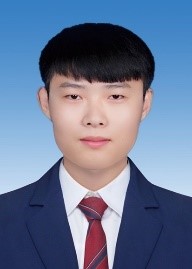
一、基本资料
姓名:陈重阳
博士、讲师
研究方向:多智能体系统协同、智能控制、有限时间控制
主讲课程:《离散数学》、《强化学习》
邮箱:cychen@xynu.edu.cn
二、个人简介
陈重阳,博士,主要从事多智能体系统协同、智能控制、有限时间控制等相关研究,发表SCI论文十余篇,主持国家自然科学基金青年科学基金项目(C类) 1项,河南省高等学校重点科研项目1项,中央高校基本科研业务费之华中科技大学技术创新基金项目1项,参与国家自然科学基金联合基金项目集成项目1项、科技创新2030 —— “脑科学与类脑研究”重大项目1项、科技创新 2030 —— “新一代人工智能”重大项目1项。
三、学习工作简历
2024.08 至今 信阳师范大学 计算机与信息技术学院 讲师
2020.09 - 2024.06 华中科技大学 控制科学与工程专业 博士
2017.09 - 2020.06 中国矿业大学 运筹学与控制论专业 硕士
2013.09 - 2017.06 临沂大学 信息与计算科学专业 本科
四、科研项目
1. 国家自然科学基金青年科学基金项目(C类),《非完全采样下基于多神经网络协同学习的多智能体系统容错控制》,62506324,主持,在研
2. 河南省高等学校重点科研项目,《基于非完全采样神经网络协同学习的多智能体系统容错控制》,26A120005,主持,在研
3. 中央高校基本科研业务费(教育部),《面向多异构智能个体的智能容错与有限时间协同》,2022JYCXJJ003,主持,结项
4. 科技创新 2030 —— “脑科学与类脑研究”重大项目(科技部),《基于神经可塑性的脉冲网络高效学习机制与类脑智能系统》,2021ZD0201300,参与,在研
5. 科技创新 2030 ——“新一代人工智能”重大项目(科技部),《开放环境下异质微电网的群智协同主动安全调控理论与方法》,2022ZD0116900,参与,在研
6. 国家自然科学基金面上项目, 《多层时变有向网络的超扩散及同步动力学研究》,62176099,参与,结项
五、发表论文
[1] C. Chen, S. Zhu, Y. Wei, and C. Yang, “Finite-time stability of delayed memristor-based fractional-order neural networks,” IEEE Transactions on Cybernetics, 2020, 50(4): 1607-1616.
[2] C. Chen, Y. Han, S. Zhu, and Z. Zeng, “Distributed fixed-time tracking and containment control for second-order multi-agent systems: a nonsingular sliding-mode control approach,” IEEE Transactions on Network Science and Engineering, 2023, 10(2): 687-697.
[3] C. Chen, Y. Han, S. Zhu, and Z. Zeng, “Neural network-based fixed-time tracking and containment control of second-order heterogeneous nonlinear multi-agent systems,” IEEE Transactions on Neural Networks and Learning Systems, 2024, 35(8): 11565-11579.
[4] C. Chen, Y. Han, S. Zhu, and Z. Zeng, “Prescribed-time cooperative output regulation of heterogeneous multi-agent systems,” IEEE Transactions on Industrial Informatics, 2024, 20(2): 2432-2443.
[5] C. Chen, S. Zhu, and Z. Zeng, "Tradeoff analysis between control time and energy consumption for delayed neural networks with discontinuous activation functions," IEEE Transactions on Neural Networks and Learning Systems, 2023, 34(8): 5012-5023.
[6] S. Zhu, C. Chen, C. Yang, J. Fu and Z. Zeng, “Finite-time stabilization and energy consumption estimation for delayed nonlinear systems,” IEEE Transactions on Systems, Man, and Cybernetics: Systems, 2022, 52(3): 1891-1900.
[7] C. Chen, S. Zhu, M. Wang, C. Yang, and Z. Zeng. “Finite-time stabilization and energy consumption estimation for delayed neural networks with bounded activation function.” Neural Networks, 2020, 131: 163-171.
[8] C. Chen, S. Zhu, and Y. Wei. “Closed-loop control of nonlinear neural networks: The estimate of control time and energy cost.” Neural Networks, 2019, 117: 145-151.
[9] S. Zhu, C. Chen, and S. Wen. “Controller design for finite-time attractive and energy consumption of stochastic nonlinear systems.” International Journal of Control, 2023, 96(1): 74-81.
[10] J. Man, Y. Sheng, C. Chen and Z. Zeng. “PDE-based finite-time deployment of heterogeneous multi-agent systems subject to multiple asynchronous semi-Markov chains.” IEEE Transactions on Circuits and Systems I: Regular Papers, 2024, 71(2): 885-897.
[11] Y. Li, Y. Han, C. Chen, Z. Zeng and J. Sun, “Online reinforcement learning control designs with acceleration mechanism for unknown multiagent systems through value iteration,” IEEE Transactions on Neural Networks and Learning Systems, 2025, 36(9): 16990-17003.
[12] Y. Han, C. Li, C. Chen, Y. Li, and D. Yang. “Impulsive fault-tolerant adaptive control on second-order nonlinear multiagent systems by extended observer approach.” Nonlinear Dynamics, 2025, 113: 1333–1351.
[13] Y. Han, Y. Li, H. Li, C. Chen, and C. Li. “A dual asynchronous impulsive neuro-adaptive control framework for multiagent systems with multiple uncertainties.” Communications in Nonlinear Science and Numerical Simulation, 2025: 109339.
[14] Y. Li, J. Li, T. Zhao, Q. Liang, Z. Yang and C. Chen. “Resolving complex backgrounds and multi-scale challenges: the ST-FSFF approach.” Engineering Letters, 2025, 33(9) .
[15] Y. Li, T. Zhao, J. Li, Q. Liang, Z. Yang and C. Chen. "SCSE-YOLO: A high-precision underwater garbage detection model." IAENG International Journal of Computer Science, 2025, 52(8).